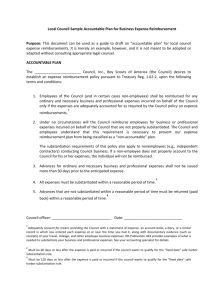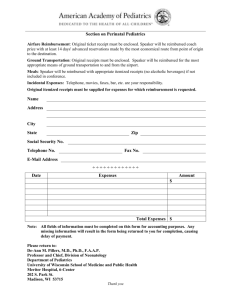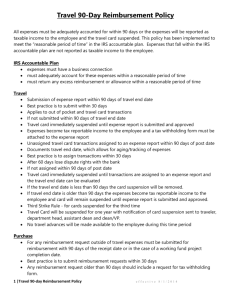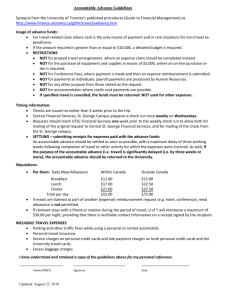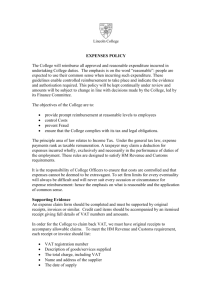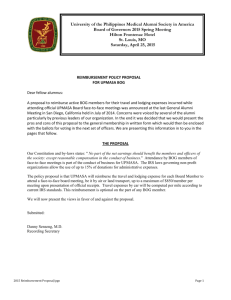Is Your Expense Reimbursement Policy Compliant with IRS and
advertisement
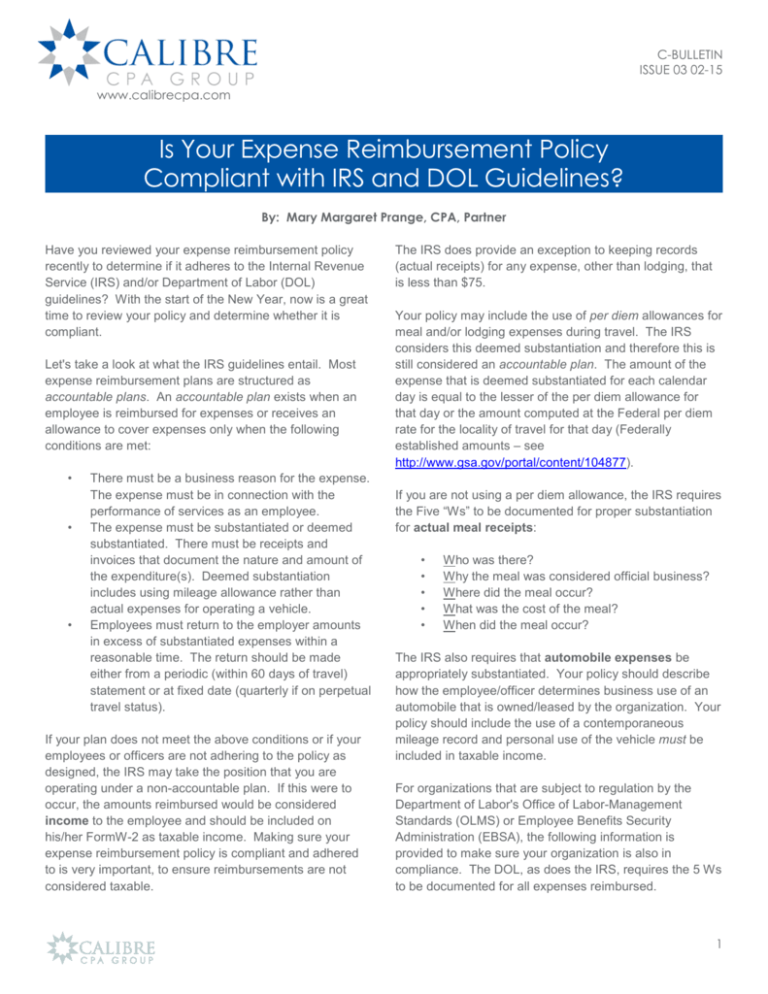
C-BULLETIN ISSUE 03 02-15 www.calibrecpa.com Is Your Expense Reimbursement Policy Compliant with IRS and DOL Guidelines? By: Mary Margaret Prange, CPA, Partner Have you reviewed your expense reimbursement policy recently to determine if it adheres to the Internal Revenue Service (IRS) and/or Department of Labor (DOL) guidelines? With the start of the New Year, now is a great time to review your policy and determine whether it is compliant. Let's take a look at what the IRS guidelines entail. Most expense reimbursement plans are structured as accountable plans. An accountable plan exists when an employee is reimbursed for expenses or receives an allowance to cover expenses only when the following conditions are met: • • • There must be a business reason for the expense. The expense must be in connection with the performance of services as an employee. The expense must be substantiated or deemed substantiated. There must be receipts and invoices that document the nature and amount of the expenditure(s). Deemed substantiation includes using mileage allowance rather than actual expenses for operating a vehicle. Employees must return to the employer amounts in excess of substantiated expenses within a reasonable time. The return should be made either from a periodic (within 60 days of travel) statement or at fixed date (quarterly if on perpetual travel status). If your plan does not meet the above conditions or if your employees or officers are not adhering to the policy as designed, the IRS may take the position that you are operating under a non-accountable plan. If this were to occur, the amounts reimbursed would be considered income to the employee and should be included on his/her FormW-2 as taxable income. Making sure your expense reimbursement policy is compliant and adhered to is very important, to ensure reimbursements are not considered taxable. The IRS does provide an exception to keeping records (actual receipts) for any expense, other than lodging, that is less than $75. Your policy may include the use of per diem allowances for meal and/or lodging expenses during travel. The IRS considers this deemed substantiation and therefore this is still considered an accountable plan. The amount of the expense that is deemed substantiated for each calendar day is equal to the lesser of the per diem allowance for that day or the amount computed at the Federal per diem rate for the locality of travel for that day (Federally established amounts – see http://www.gsa.gov/portal/content/104877). If you are not using a per diem allowance, the IRS requires the Five “Ws” to be documented for proper substantiation for actual meal receipts: • • • • • Who was there? Why the meal was considered official business? Where did the meal occur? What was the cost of the meal? When did the meal occur? The IRS also requires that automobile expenses be appropriately substantiated. Your policy should describe how the employee/officer determines business use of an automobile that is owned/leased by the organization. Your policy should include the use of a contemporaneous mileage record and personal use of the vehicle must be included in taxable income. For organizations that are subject to regulation by the Department of Labor's Office of Labor-Management Standards (OLMS) or Employee Benefits Security Administration (EBSA), the following information is provided to make sure your organization is also in compliance. The DOL, as does the IRS, requires the 5 Ws to be documented for all expenses reimbursed. 1 C-BULLETIN ISSUE 03 02-15 www.calibrecpa.com The DOL requires that your policy must provide for original receipts and written descriptions of the above. A lost receipt should be the exception and your reimbursed expense policy should require a signed statement from the employee or officer regarding any lost receipts. There should be substantiation for all reimbursed expenses, i.e., the IRS rule for anything under $75 is not applicable for organizations regulated by the DOL. Specifically, for meal expense reimbursements, the DOL requires itemized receipts which detail every individual item ordered on the bill. This requirement is not satisfied with just the credit card charge slip – your reimbursement policy must require both the credit card charge slip (which should include the tip) and the detailed itemized receipt. Many organizations provide advances for employees that will be on official business travel status and this is an acceptable practice. However, the DOL can take the view that advances for travel are considered loans unless the following conditions are met: • • Similar to the IRS, the DOL requires certain substantiation for use of organization-owned/leased vehicles. This substantiation includes a contemporaneous mileage log detailing the following for each trip: • • • • Date of travel Number of miles driven Whether personal or business (if business, indicate purpose) Odometer reading If your policy allows for the reimbursement of automobile expenses related to personal automobiles, the DOL requires at least one record that includes date of travel, locations traveled to and from, number of miles driven, and business purpose of each use. Take a look at your organization's policy for reimbursing employee/officer expenses and make sure your policy is compliant with government regulations. Then make sure you are adhering to your policy. The advance does not exceed the amount reasonably expected to be incurred and is accounted for or repaid within 30 days of the trip; or The advance is a standing advance to officer/employee who must frequently travel on official business and the advance does not exceed average monthly travel expenses and employee/officer does not exceed 60 days without engaging in official travel. The information within our C-Bulletin is distributed with the understanding that the author(s), publisher, and distributor are not rendering legal, accounting or other professional advice or opinions on specific facts or matters, as each individual circumstance is unique. All articles are for the exclusive and private use of our clients, prospects, and business associates. In accordance with IRS Circular 230, any tax advice contained in the body of this material was not intended or written to be used, and cannot be used, by the recipient for the purpose of 1) avoiding penalties that may be imposed under the Internal Revenue Service Code or applicable state or local tax law provisions, or 2) promoting, marketing or recommending to another party any transaction or matter addressed herein. PRIVACY NOTICE: Calibre CPA Group, PLLC does not sell, distribute or solicit any information provided to us from our newsletters, mailings or website to any third parties. We value our relationships with our clients, associates, and friends, and treat this information as highly confidential. © Calibre CPA Group, PLLC 2
